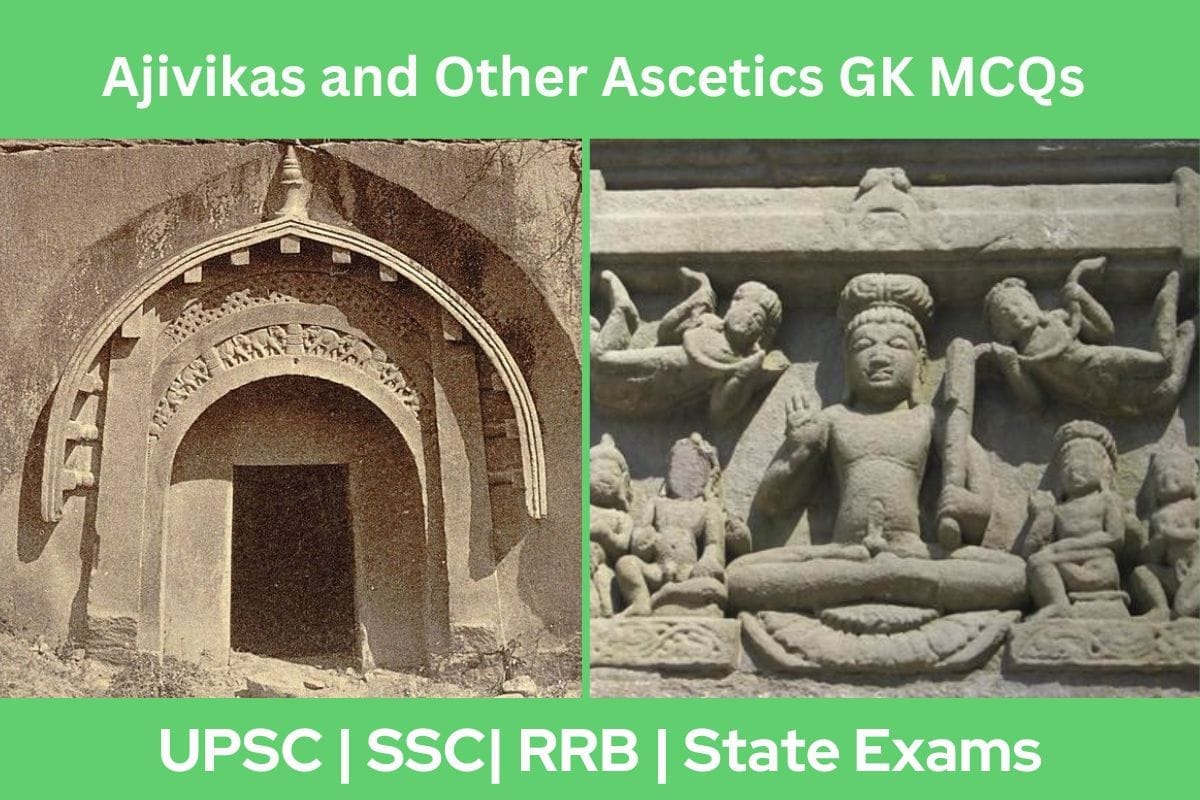
The Ajivikas and Other Ascetics were ancient Indian ascetic communities that played a significant role in shaping the spiritual and philosophical landscape of the subcontinent. This set of 10 multiple-choice questions (MCQs) aims to test your knowledge about these ascetic traditions, providing valuable insights for government job comparative exams.
MCQs with Answers and Explanations:
1. The term ‘Followers of the way of life’ is associated with which of the following?
- Hinduism
- Buddhism
- Jainism
- Ajivikas
Show Answer
Correct Answer: Ajivikas
The Ajivikas, also known as ‘Followers of the way of life,’ were an ascetic order that emerged during the time of Buddha and Mahavira. The Ajivika sect lasted until the 14th century and challenged the Brahmanical dominance. There were approximately 62 sects, including the Ajivikas, that coexisted during that time.
2. Ajivika was founded by which of the following?
- Makkhali Gosala
- Janak
- Krishna
- Tirugyan
Show Answer
Correct Answer: Makkhali Gosala
The Ajivika sect was founded by Makkhali Gosala. During the third century BCE, the Ajivikas gained popularity in the Magadha region, and Mauryan kings donated several caves in honor of Ajivika monks.
3. Which of the following was the main expounder of materialistic philosophy?
- Ajivikas
- Charvaka
- Buddhism
- Jainism
Show Answer
Correct Answer: Charvaka
Charvaka was indeed the main expounder of materialistic philosophy. Charvakas were known for rejecting the authority of the Vedas, denying the existence of God or any supernatural power, and advocating for a materialistic and atheistic perspective. However, much of the literature related to Charvaka philosophy has been lost over time, making it challenging to reconstruct their entire philosophy.
4. Which of the following has been a patron of the Ajivika order?
- Prasenjit
- Chanakya
- Pushyamitra Shunga
- None of the above
Show Answer
Correct Answer: Prasenjit
Prasenjit, the King of Kosala, was a patron of the Ajivika order. The Ajivikas were known for their rigid fatalism and determinism, and they believed that the entire universe’s affairs were ordered by a cosmic force called niyati.
5. Which of the following is also known as Lokayata?
- Charvak
- Mahavira
- Buddha
- Shaivites
Show Answer
Correct Answer: Charvak’
Lokayata is another name for Charvaka, which is the main exponent of materialistic philosophy. The term Lokayata translates to ‘derived from the local people,’ indicating its roots in the common people’s perspectives. Charvakas rejected the Vedas, rituals, and the concept of God or supernatural powers.
6. Which of the following is the earliest known teacher of complete materialism?
- Makkhali Gosala
- Ajita Kesakamblin
- Mahavira
- Dashratha
Show Answer
Correct Answer: Ajita Kesakamblin
Ajita Kesakamblin is associated with early materialistic thought, similar to the Charvakas. He lived during the same period as Gautama Buddha and is mentioned in Buddhist scriptures as a teacher of complete materialism. While Ajita Kesakamblin’s views were materialistic, the specific sect or order he founded may not have been preserved in historical records.
7. Which of the following statements are correct with respect to Ajivikas?
1. They were rigid fatalists.
2. They were determinists.
3. They believed that the affairs of the entire universe were ordered by a cosmic force called niyati.
Select the correct option from the codes given below:
- Only 1
- Only 2 & 3
- Only 3
- 1, 2, and 3
Show Answer
Correct Answer: 1, 2, and 3
“The correct statements with respect to Ajivikas are as follows:
They were rigid fatalists.
They were determinists.
They believed that the affairs of the entire universe were ordered by a cosmic force called niyati.
The Ajivikas indeed held rigid deterministic beliefs, where they thought that everything, including human actions, was predestined by niyati, a cosmic force. This deterministic worldview contributed to their status as rigid fatalists.”
8. Which of the following statements are correct with respect to Ajivikas?
1. Karma is a fallacy.
2. Nirvana can only be reached after living through an immense number of lives.
3. Ajivikas practiced austerities.
Select the correct option from the codes given below:
- Only 1
- Only 2 & 3
- Only 3
- 1, 2, and 3
Show Answer
Correct Answer: 1, 2, and 3
The correct statements with respect to Ajivikas are:
They believed that karma is a fallacy.
They believed that nirvana can only be reached after living through an immense number of lives.
Ajivikas practiced austerities.
9. Who founded the Ajivika sect?
- Gautama Buddha
- Mahavira
- Makkhali Gosala
- Adi Shankaracharya
Show Answer
Correct Answer: Makkhali Gosala
Makkhali Gosala was the founder of the Ajivika sect.
10. Select the correct statements among the following.
1. Ajivikas wore no clothes.
2. Ajivikas lived as ascetic monks who lived in organized groups.
3. Ajivikas practiced caste discrimination.
Select the correct option from the codes given below:
- Only 1
- Only 1 & 2
- Only 2 & 3
- 1, 2, and 3
Show Answer
Correct Answer: Only 1 & 2
The correct statements with respect to Ajivikas are:
Ajivikas wore no clothes.
Ajivikas lived as ascetic monks who lived in organized groups.
Ajivikas did not practice caste discrimination, and people from all walks of life could join their order.



Leave a Reply